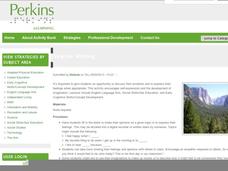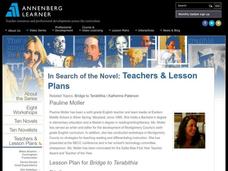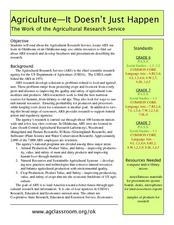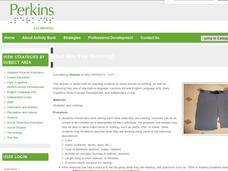EngageNY
Presenting a Research-Based Claim: Visual Aid and Peer Critique
Back to the drawing board. Scholars work on the visual to complement their claim presentations using the Criteria for the Cascading Consequences Chart Visual as a guide. They then practice their presentations with partners.
Perkins School for the Blind
Encouraging Students Who are Blind or Visually Impaired to Express Their Feelings and Explore Imagination
Being expressive in a creative, empathetic, or imaginative way is not only fun, it builds good pre-writing and communication skills. Learners with visual impairments have a roundtable discussion session where several sentence frames are...
Mobile Education Store
ConversationBuilder
Some students struggle in social situations or when it comes to conversing with peers. Conversation is key in developing relationships and in building strong social skills. This app can be used to help children with social anxiety, ASD,...
Curated OER
Jump-Starting Research with Visual Thesaurus
Learners navigate the Visual Thesaurus to find keywords for research. In this keywords lesson, students use synonyms, hypernyms and hyponyms to find keywords. Learners understand why some searches are effective and some are ineffective.
Perkins School for the Blind
Prepositions
When most children learn about prepositions, they are provided with a visual to show them the concepts of on, in, near, and beside. For learners with visual impairments, concepts need to be constructed in a very concrete way. A stuffed...
Perkins School for the Blind
What Would You Do If...?
What would you do if...? That's a great question, and, when posed to learners with visual impairments, a question that can foster concept development and speaking and problem-solving skills that relate to real-life situations. The...
Curated OER
Bridge to Terabithia
Young scholars explore scenes from Katherine Paterson's book, Bridge to Terabithia. In this visualization lesson, students listen to the story read aloud. The young scholars then choose words and phrases that paint a picture in their...
Perkins School for the Blind
Familiar Sounds
To foster concept development and auditory discrimination skills, learners with visual impairments listen to identify a variety of common sounds. The teacher makes recordings of various sounds, including those found in the home, at the...
Perkins School for the Blind
Learning to Express Myself
Expressing one's wants and needs is vital for learners of any age or ability level. Young children with visual impairments and intellectual disabilities practice asking for preferred items, foods, or activities in a structured manner....
Perkins School for the Blind
Treasure Hunt
On, over, and under are some very common prepositions; but how can you teach these concepts to children with visual impairments? Here, is one way. Kids will practice following verbal commands as they go on a classroom treasure hunt. They...
Curated OER
Street Art Project
Illuminate your playground with chaulk images. Young aratists use the web to research the work of Keith Haring. Groups then design their own piece of visual art and recreate their images on the school sidewalks of blacktop.
Curated OER
Girders and Wrecking Ball Activity
As learners build the "girders" of conversation by staying consistent on a particular topic, they avoid the "wrecking ball" of an off-topic comment. To help students develop this important conversation skill, this resource provides them...
Curated OER
Listening Picture Check Sheet & Listening Picture Prompts
Help learners build greater self-awareness and improve listening skills with these visual prompt sheets. Beginning with an "Are you really listening?" overview sheet, the following pages use large visuals to remind pupils what it means...
Curated OER
PREPOSITION WORD STRIPS
In this visual worksheet, prepositions are viewed alongside an illustration which describes the preposition. This is a good activity for English-learners of all ages. Fifteen vocabulary word strips are provided.
Curated OER
The Farmer Cares for the Land
Young scholars explore farming by creating visual demonstrations. In this agriculture lesson, students read assigned text about a farmer's duty and identify the events that have taken place in the history of agriculture. Young scholars...
Curated OER
Agriculture: It Doesn't Just Happen
After reading an informational text on the Agricultural Research Service, learners research the role of the ARS in Oklahoma. Using reputable online sources, they label a map of the state with relevant areas. Researchers focus on one of...
Perkins School for the Blind
Silly or Sensible?
Is it silly or sensible? That's a great question, and it's the question that will drive this entire lesson. Learners with special needs and visual impairments work together to analyze verbal information. The instructor makes a statement,...
Curated OER
Keith Haring Posters
Middle schoolers observe visual art by utilizing the Internet in class. In this Keith Haring lesson, students define the art which Haring has created over the years and examine previous art work online. Middle schoolers complete...
Perkins School for the Blind
Where Shall I Put It?
Position and positional phrases are concepts that need to be constructed for learners with low or no vision. Help them gain competence and a conceptual understanding of words like on, in, and under with a funny game. After gathering a...
Perkins School for the Blind
What Do I Hear?
Being able to give positive reinforcers to a child starts with knowing what the child likes. Intended for children with blindness, this instructional activity gives you a way to determine the types of music your learners like best. You...
Perkins School for the Blind
Learning Names of Articles of Clothing
What to wear today; such a vexing question. Spend some time introducing the names, fabrics, types, colors, and functions of various articles of clothing to your class. Each child will take turns asking each other what they are wearing....
Perkins School for the Blind
Conversation Skills
It is so important for learners with multiple disabilities to learn how to communicate for both social and functional reasons. Each child will choose a topic from the list and generate five questions related to that topic. They'll split...
Perkins School for the Blind
Circle Time
Oftentimes children or teens with one or more disability are reluctant to participate in whole-group activities. Foster good participation, verbal expression, and social skills through daily circle time activities. Each day you and your...
Perkins School for the Blind
Personal Information
"Hi, how are you? My name is___." Seems simple enough but it's not always that easy to recall and relate factual information about yourself. Learners with multiple disabilities practice memorizing and relaying personal information about...
Other popular searches
- Visual Arts
- Visually Impaired
- Visual Art Self Portrait
- Visual Art Lesson Plans
- Teacher Resources Visual Art
- Visual Art Lessons
- Visual and Performing Arts
- Visual Art Lessons Symmetry
- Visual Discrimination
- Visual=art
- Visual Art Tessellations
- Visually Impaired Blind

























